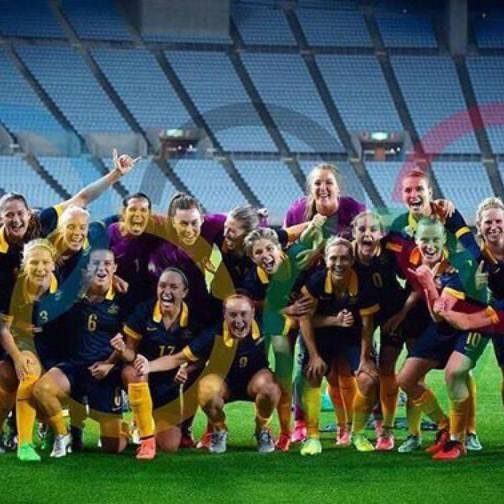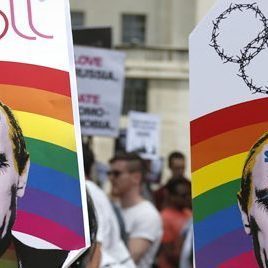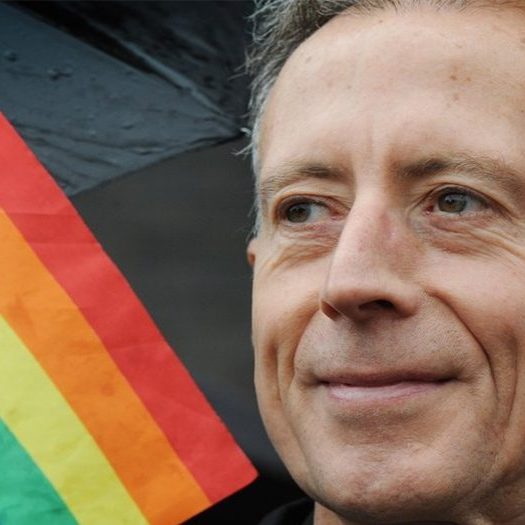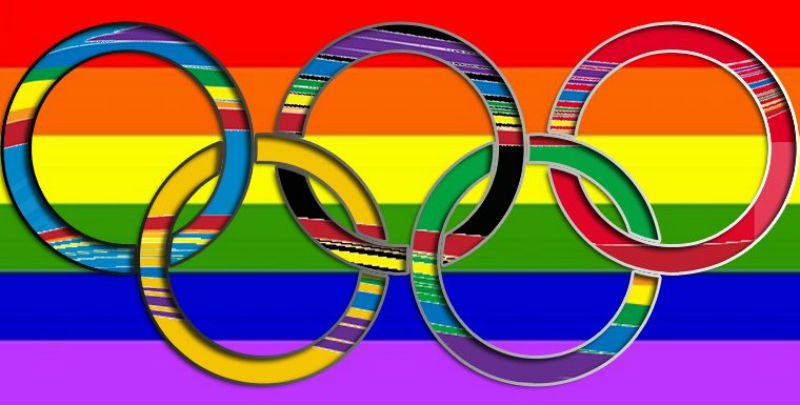 31 out lesbians athletes compete in Rio.
31 out lesbians athletes compete in Rio.
Only a few days in and the 2016 Rio Olympics have been amazing for Team USA. Watching Katie Ledecky win the gold in the 400 meter freestyle was incredible – she actually won by five full seconds, which is unheard of. Ledecky beat her own previous world record. It was as if she was in a different competition from the other women. In women’s gymnastics, which is the most-watched of all the sports in the summer Olympics – Team USA shines. Simone Biles and Aly Raisman are among the most extraordinary gymnasts in the world and each has particular moves named for her. Laurie Hernandez is only 16, but she is destined to be the next star on USA’s gymnastics horizon. Plus, America’s teams look like America–excitingly diverse. Ibtihaj Muhammad also made Olympic history by being the first American athlete to compete at the Games in a hijab, the traditional head scarf worn by Muslim women. Muhammad, who is the 8th ranked saber fencer won her first round on August 8 competitions. She explained she chose fencing as her sport because she could wear hijab and modest dress and still excel.
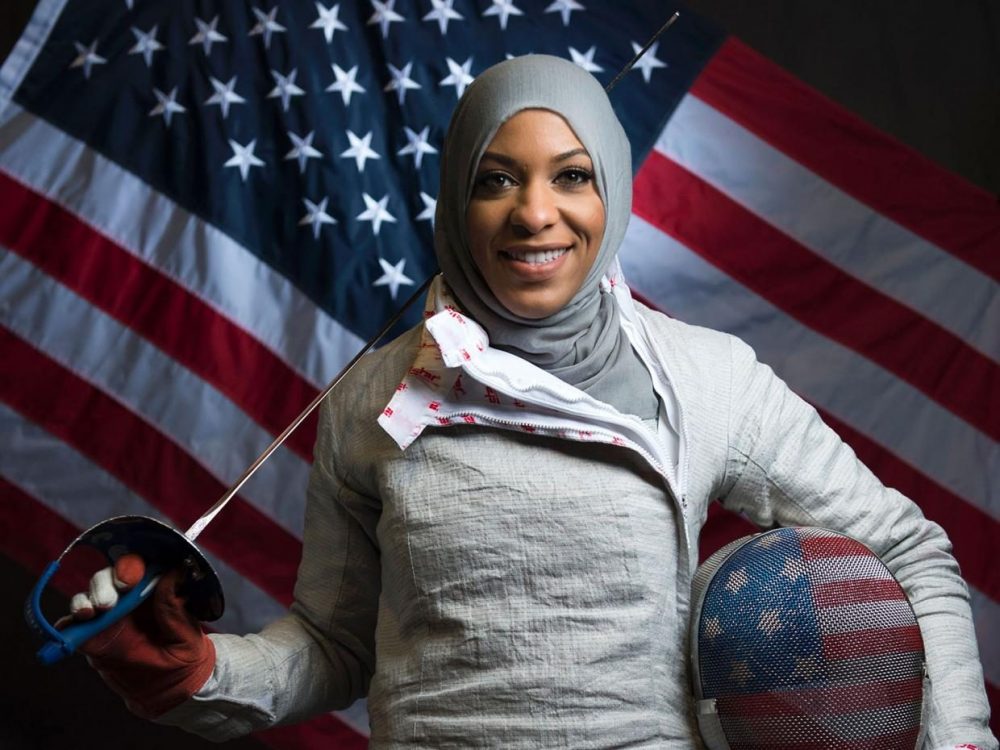
Muhammad also took the Olympic spotlight to highlight how she feels Republican candidate Donald Trump has hurt her and other American Muslims. “I think his words are very dangerous,” Muhammad told CNN in an interview. “When these types of comments are made, no one thinks about how they really affect people. I’m African American. I don’t have another home to go to. My family was born here. I was born here. I’ve grown up in Jersey. All my family’s from Jersey. It’s like, well, where do we go?”
Muhammad is not the only one speaking her truth this Olympics. While there aren’t any LGBT people competing for Team USA in swimming, gymnastics or fencing, Rio 2016 has the most out lesbian and gay participants in the history of the games, with 31 lesbians, ten gay men and one bisexual man from a dozen countries competing, which is more exciting news about the inclusivity of the Olympics.
Among the lesbian competitors are the first out lesbian married couple, Kate and Helen Richardson-Walsh. The two play field hockey for Great Britain and Kate is the captain of the team. In the London Olympics in 2012, they won bronze, Great Britain’s first Olympic hockey medal in two decades. At Rio, they have a strong chance at winning gold.
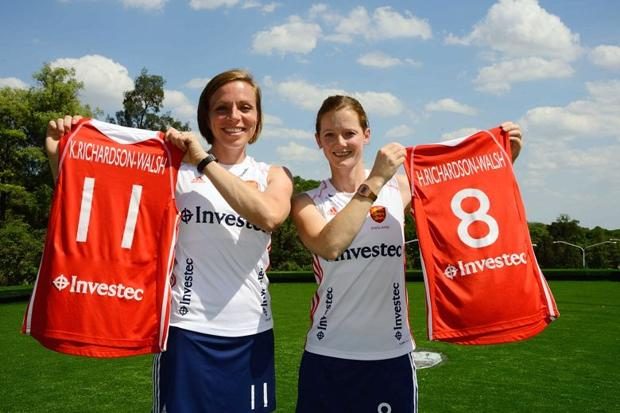
In an interview with The Sun newspaper in London, Kate, who played with a metal plate in her face at London 2012 just five days after breaking her jaw, said, “We just want to show that it’s a normal thing. We’re not out there shouting it, it’s just part and parcel of who we are.” Spouse Helen told The Sun, “It was definitely a conscious decision (to come out). If you are really open about it, people say, ‘Why do you make such a big deal about it? If you don’t mention it you could be seen as hiding it, which we didn’t want either.”
Helen, who suffered a broken back and two surgeries in 2014, said it’s important that lesbian athletes come out for a range of reasons – not the least of which is broadening human rights for LGBTQ people. She said, “Those messages we get from time to time have made it really pleasing that we have been so open. When people say ‘you’ve helped me come out to my parents’ or ‘deal with my own sexuality’ it’s really powerful.”
Also on the British field hockey team are Susannah Townsend and Dirkie Chamberlain, who are also partnered.
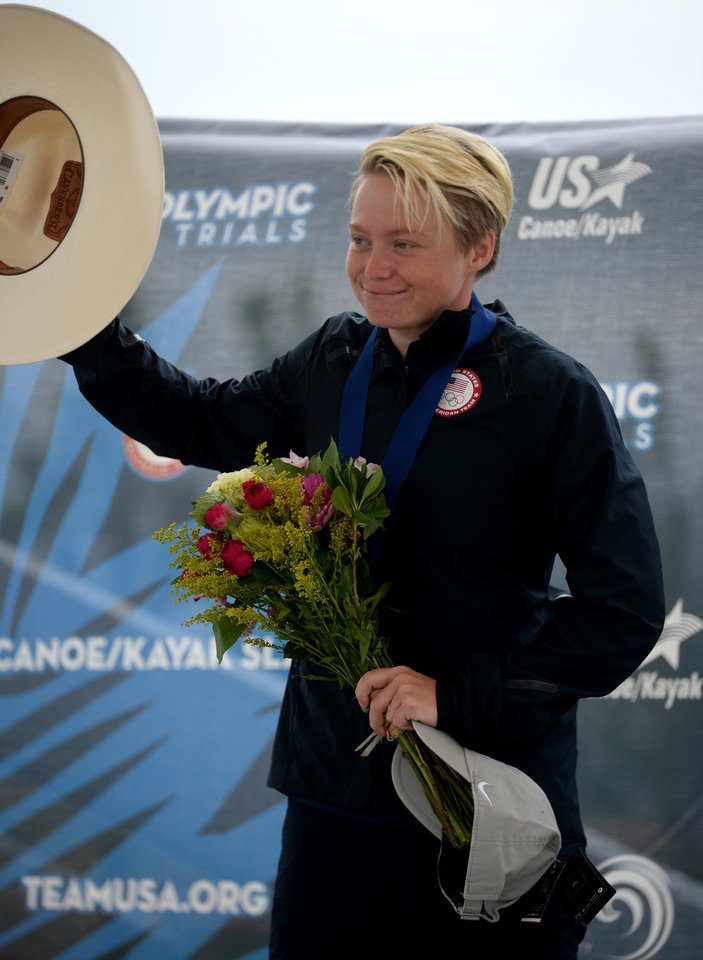
Team USA has more out lesbians than any other country. Of the 10,444 athletes competing, America has more entrants in the Olympics than any other country – 554. Of the LGB athletes, there are eight lesbians: Elena Delle Donne, Seimone Augustus, Angel McCoughtry and Brittney Griner are on the basketball team; Jillion Potter and Kelly Griffin are on the rugby team; Megan Rapinoe is on the soccer team and Ashley Nee is a whitewater slalom kayaker.
The sport with the most lesbians is soccer, with nine competitors from nine different countries as diverse as Sweden and Australia. Among the other players is a lesbian javelin thrower, Sunette Viljoen from South Africa, a boxer, Nicola Adams, from Great Britain, a track and fields star, Dutee Chand, from India, Australian soccer player Michelle Heyman, and one of the world’s most medaled beach volleyball players, Brazil’s own Larissa França. França is the all-time leader in the sport with more medals and points than anyone. She won Bronze last time and has nearly 60 medals overall in her sport.
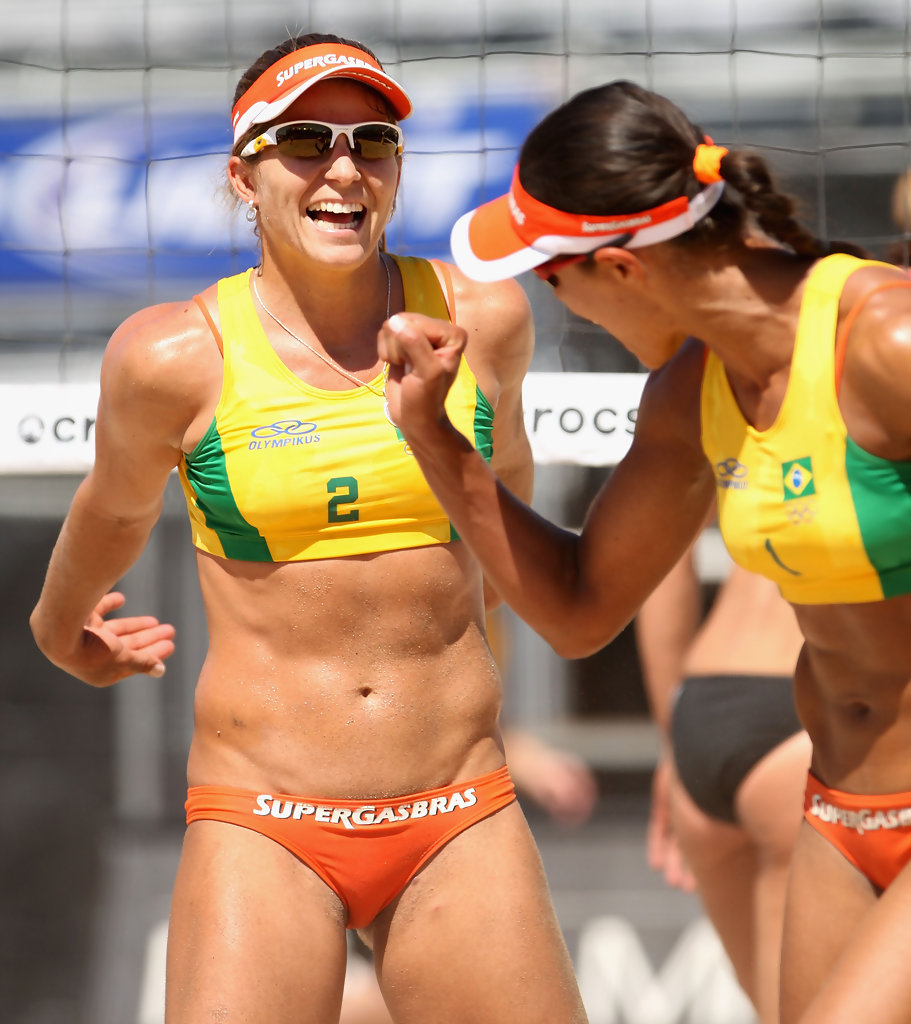
Discus has always seemed like a lesbian sport to us and in the past an east German discus queen would have seemed like a lesbian stereotype but although she’s 6’4″, Nadine Müller looks nothing like what you’d imagine from the sport. Lithe and blonde, she is all sinew. And something to watch – she’s one of the most physically powerful athletes among the out lesbian cadre.
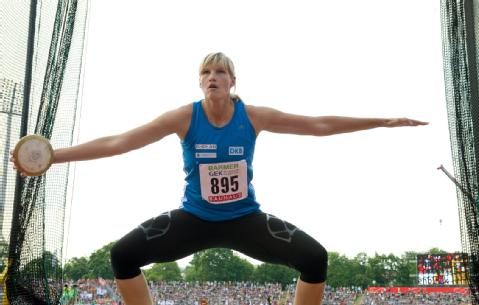
One of the most inspiring competitors is Jillion Potter. The 30-year-old rugby player survived a broken back and neck in 2010 suffered in a competition in Canada. She was told she might never walk again.
Yet the fight of her life began in 2014 when she was competing in the World Cup and discovered a strange lump under her tongue. Whatever it was continued to grow quickly and soon her breathing was obstructed. Potter, who had just married her longtime partner and fellow rugby player Carol Fabrizio in 2013 was terrified – and rightly.
That mass turned out to be one of the most rare cancers, synovial sarcoma, a soft-tissue cancer. It was already at stage 3 when it was discovered. And because it is so rare – only about 3 people per million get it each year – treatment is sketchy. Doctors wanted to remove Potter’s jaw and half her tongue.
Potter said no, opting for a different, but incredibly grueling treatment plan which also had the possibility of killing her. She underwent treatment at Houston’s MD Anderson, one of the world’s leading cancer research and treatment hospitals. She and her spouse flew there for the treatments which required a week in the hospital every three weeks.
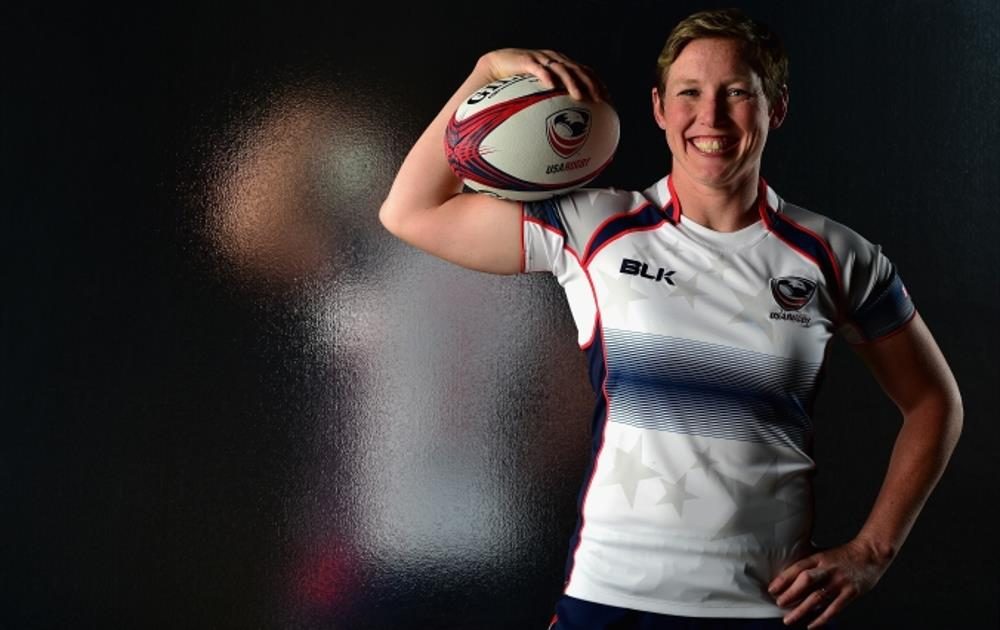
Potter had Frabrizio help her to walk the mile and a half around the hospital every day during her treatment so she could stay in shape. The Albuquerque Journal reported that Potter wore her Team USA jersey throughout – even as she lost her hair and muscle mass.
Yet now Potter is in Rio, competing for Team USA in the most intensive rugby events, the sevens. In an adorable video for NBC Sports that many Olympians have participated in, Potter credits Fabrizio with keeping her…flossing.
Potter’s openness about her lesbianism, her marriage and her cancer underscore how important these revelations can be for other young athletes and fans.
The most recent out lesbian athletes for Team USA is a basketball player many of us have been watching for a long time. Elena Delle Donne, 26, the WNBA’s MVP, came out in an interview in the August issue of Vogue.
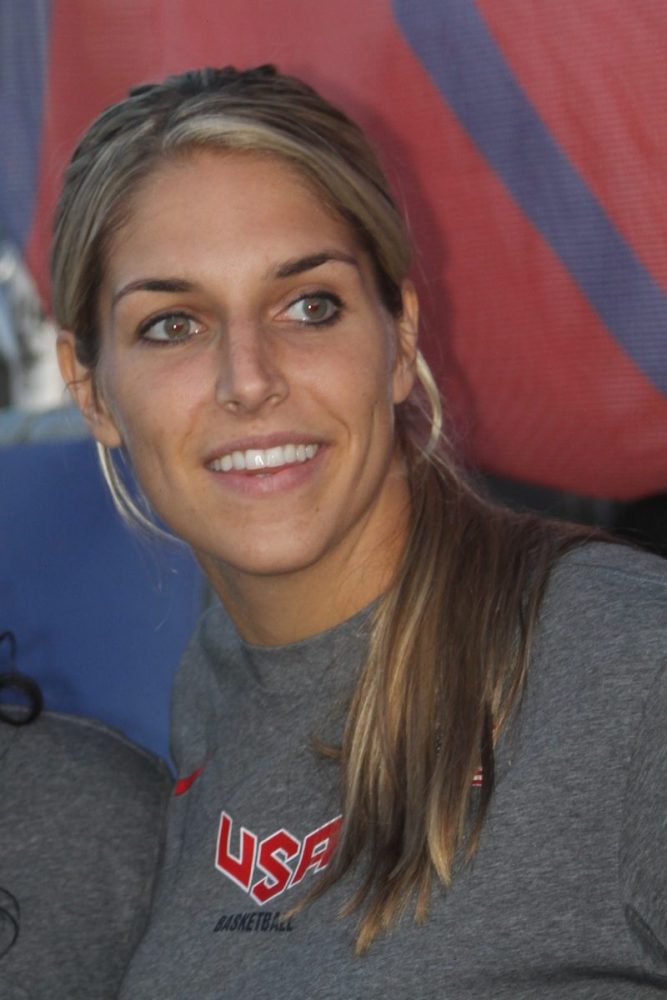
Vogue noted, “Elena divides her time between traveling with her team, the Chicago Sky, and her family’s home in the rolling green landscape of Wilmington, Delaware. She and her fiancee, Amanda Clifton, keep apartments in both Chicago and Wilmington.”
In an interview with the Chicago Tribune, Delle Donne said, “It was just one of those articles where they came into my home, spent a couple days with me and Amanda is a huge part of my life. So to leave her out wouldn’t have made any sense. It’s not a coming out article or anything. I’ve been with her for a very long time now and people who are close to me know that and that’s that.”
Delle Donne said she wanted Clifton’s privacy respected. She told the Tribune, “As the future keeps moving on, I don’t plan on having our relationship out in the public and all this media on it, but obviously there’s excitement right now because people see it for the first time.”
The impact of all these out lesbian athletes cannot be minimized. The number of out lesbian and gay Olympians has been growing over the past decade. Gay diver Greg Louganis, 56, has detailed his experiences of basically being the first out gay man to participate in the Olympics and how it devastated his career to come out. Louganis won gold in 1984 and 1988, but while there were likely as many or more lesbian and gay athletes 30 years ago as there are in 2016, the lack of an out presence put a target on Louganis. While his fellow competitors made lucrative endorsement deals, Louganis struggled with homelessness.
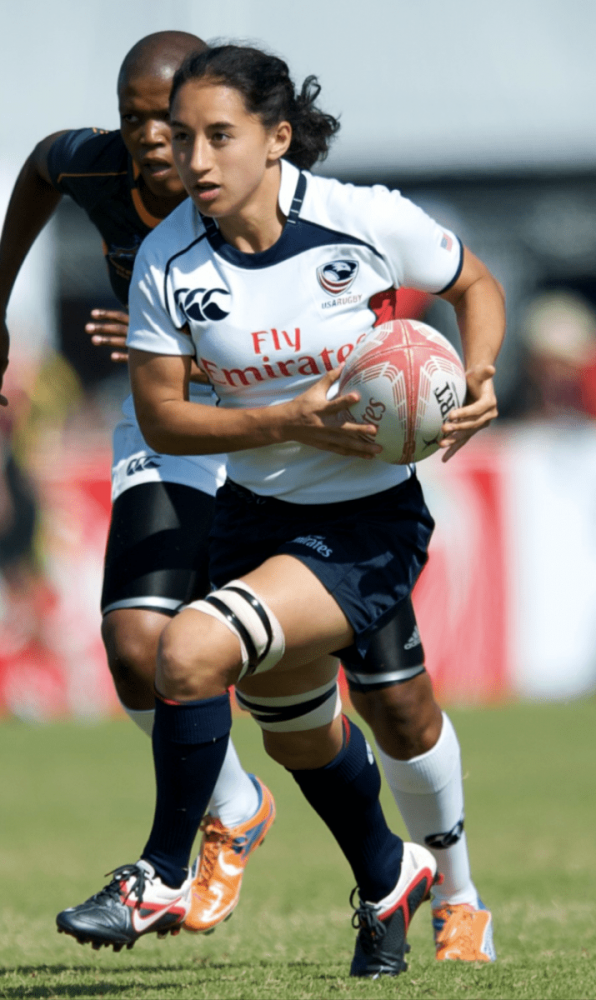
In 2008, there were 12 out LGB athletes: one gay man, one bisexual woman and ten lesbians, including three Americans. In 2010, the numbers were lower – six lesbians, no Americans. The 2012 London summer Olympics saw an uptick – 23 athletes out of the 10,768 participants were openly gay, lesbian or bisexual. Again, lesbians outnumbered gay men. Three gay men, 20 lesbians, including three Americans.
In 2014, anti-gay statements by Russian President Vladimir Putin put the Sochi winter Olympics on notice. LGBTQ Russians were already under repressive threats from both their own government and roving gangs of skinheads and other anti-gay thugs. But Putin said any gay athletes coming to Russia had better keep their gayness hidden.
In a statement widely distributed among Russian and foreign news agencies, Putin said, “We do not have a ban on non-traditional sexual relationships. We have a ban on the propaganda of homosexuality and pedophilia. I want to underline this. Propaganda among children. These are absolutely different things – a ban on something or a ban on the propaganda of that thing.”
.jpg) Michelle Heyman
Michelle Heyman
Putin made the homophobic and erroneous link between homosexuality and pedophilia, “We are not forbidding anything and nobody is being grabbed off the street, and there is no punishment for such kinds of relations. You can feel relaxed and calm [in Russia], but leave children alone please.”
Putin’s statements had come after a controversial law passed in 2013 which criminalized “homosexual propaganda.” It was a loose term that could – and has – mean anything.
Yet despite – or maybe because of – Putin’s homophobic warnings, Sochi still had seven openly lesbian athletes. No Americans, no gay men. But a brave statement by those women from the Netherlands, Austria, Australia, Slovenia and Canada.
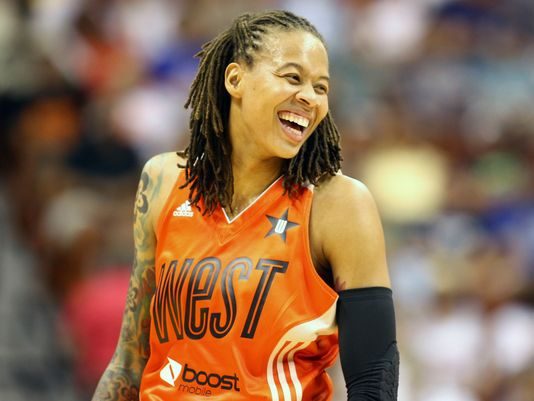
Rio has provided unique problems for the lesbian and gay athletes and LGBTQ people who have come to see them. Anti-gay violence is commonplace in Rio and throughout Brazil. As the New York Times reported in July, “Brazilians have been confronting their own epidemic of anti-gay violence—one that, by some counts, has earned Brazil the ignominious ranking of the world’s deadliest place for lesbians, gays, bisexuals and transgender people.”
According to the NYT report, a stunning “1,600 people have died in hate-motivated attacks in the past four and half years, according to Grupo Gay da Bahia, which tracks the deaths through news articles. By its tally, a lesbian, gay or transgender person is killed almost every day in this nation of 200 million.”
The world’s biggest gay pride parade is held every year in the city of São Paulo and Carnival in Rio is known for its embrace of LGBTQ people. But the violence is pervasive.
“We live off this image as an open and tolerant place,” said Jandira Queiroz, the mobilization coordinator at Amnesty International Brazil. “Homophobic violence has hit crisis levels, and it’s getting worse.”
August 8 it was reported that female soccer players at the Olympics have been plagued with homophobic slurs in Portuguese. Women players have heard shouts of “bicha” and “puta” from Brazilian fans. Athletes have also been called “Zika”–a new slur being used.
Team USA’s Megan Rapinoe told the LA Times on August 8 that the “hurtful” attacks are part of a “mob mentality. I don’t think that all Brazilians fans or everyone that was there last night is homophobic.” But, Rapinoe said, fans have a responsibility to call out such behavior which has become increasingly common at women’s soccer games globally.” I think that they are complicit in it as long as they’re doing it,” Rapinoe said.
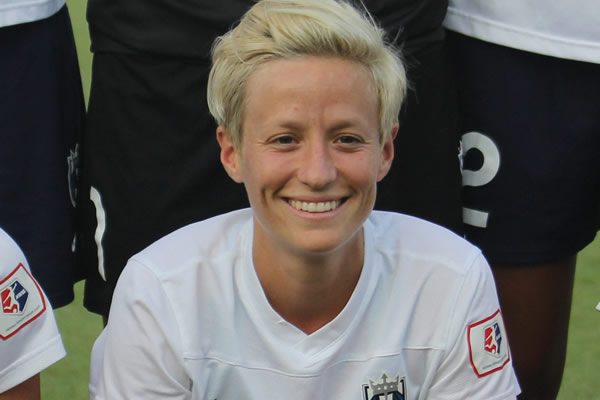
“FIFA [Fédération Internationale de Football Association, the international soccer/football governing body] can crack down as much as they want but it’s up to individuals in the stands to not participate in that kind of behavior,” Rapinoe asserted.
FIFA issued fines against several teams for lesbophobic chants from fans in Chile, Paraguay, Peru, Mexico, El Salvador, Honduras and Croatia. There has been no response from Rio Olympics organizers thus far, though.
Couple that reality in Rio with the fact that the Olympics features representatives from the 79 countries of the world where it’s illegal to be lesbian or gay – meaning arrests, imprisonments, even the death penalty. Iran has a particularly troubling history with LGBTQ people. There lesbians and gay men have been ordered to undergo enforced sex change operations. All of which means tensions may be simmering below that air of comity that was much-promoted in the lush opening ceremonies.
The Olympics is meant to be a diplomatic as well as sporting event. But what happens when openly lesbian and gay athletes are playing against teams or individuals from countries where being lesbian or gay is anathema?
In an interview, Hudson Taylor, founder of Athlete Ally, a nonprofit organization that is looking to end anti-LGBT sentiment in sports, asserted, “There are closeted Olympians who compete in every single athletic competition. There is still something about sports culture that is less inclusive than it can and should be.”

And that may be the most important standard at the Olympics. One which, it is to be hoped, will help bridge some of the divide between out athletes and those still in the closet. It will also show the estimated 4 billion viewers who will watch at least part of the Olympics that these brave lesbian (and gay male) athletes are just like all the others in Rio – focused on excellence and driven to compete by their love of the sport.
Brittney Griner put it succinctly. “As an out lesbian, African-American woman, I am proud to represent our country and the diversity that makes us so strong,” Griner told ThinkProgress about competing in the Olympics. “All kids, no matter what their background, religion or orientation can find a role model on Team USA and I hope that especially at this point in history, that our diverse group striving for one common purpose will inspire a sense of unity in everyone.”

